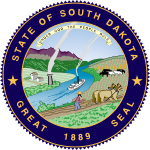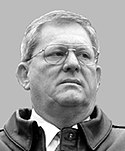
The governor of South Dakota is the head of government of South Dakota. The governor is elected to a four-year term in even years when there is no presidential election. The current governor is Kristi Noem, a member of the Republican Party who took office on January 5, 2019.

William John Janklow was an American lawyer and politician and member of the Republican Party who holds the record for the longest tenure as Governor of South Dakota: sixteen years in office. Janklow had the third-longest gubernatorial tenure in post-Constitutional U.S. history at 5,851 days.
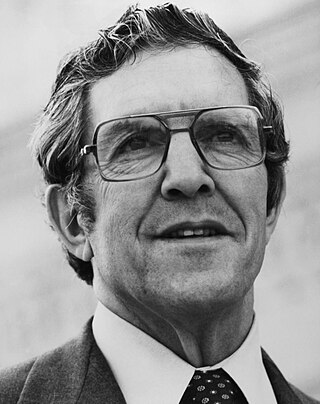
Ellis James Abdnor was an American politician who served as a member of the United States Senate from South Dakota. He was also the 15th Administrator of the Small Business Administration under presidents Ronald Reagan and George H. W. Bush.

William Preston Graves is an American former politician who was the 43rd governor of Kansas from 1995 until 2003.

Walter Dale "Walt" Miller was an American politician and member of the Republican Party. He served as the 29th Governor of South Dakota from 1993 to 1995, having assumed the office upon the death of George S. Mickelson. He was, at age 67 upon taking office, the oldest person to serve as the Governor of South Dakota.
James W. Abbott is an American retired politician and academic, most recently serving as the president of the University of South Dakota from 1997 to 2018. Abbott was the Democratic nominee in the 2002 South Dakotan gubernatorial election. Abbott is a distinguished alumni of the Lambda Chi Alpha Fraternity.

The structure of the government of South Dakota is based on that of the federal government, with three branches of government: executive, legislative, and judicial. The structure of the state government is laid out in the Constitution of South Dakota, the highest law in the state. The constitution may be amended either by a majority vote of both houses of the legislature, or by voter initiative.

The 1994 Alabama gubernatorial election was held on November 8, 1994, to select the governor of Alabama. The election saw Republican Fob James defeat Democratic incumbent Governor Jim Folsom Jr. in an upset.
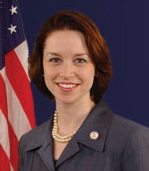
The 2002 United States House of Representatives election in South Dakota took place on Tuesday, November 5, 2002. Voters selected a representative for their single At-Large district, who ran on a statewide ballot.

The 2002 South Dakota gubernatorial election took place on November 2, 2002 to elect a Governor of South Dakota. Republican nominee Mike Rounds was elected, defeating Democratic nominee Jim Abbott.
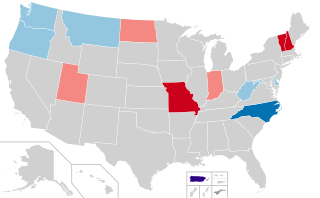
United States gubernatorial elections were held on November 8, 2016, in 12 states and two territories. The last regular gubernatorial elections for nine of the 12 states took place in 2012. The last gubernatorial elections for New Hampshire, Oregon, and Vermont took place in 2014, as Oregon held a special election due to the resignation of Governor John Kitzhaber, while the governors of New Hampshire and Vermont both serve two-year terms. The 2016 gubernatorial elections took place concurrently with several other federal, state, and local elections, including the presidential election, Senate, and House elections.

The 1998 South Dakota gubernatorial election took place on November 3, 1998, to elect a Governor of South Dakota. Republican incumbent Bill Janklow was re-elected, defeating Democratic nominee Bernie Hunhoff.
Bernie P. Hunhoff is an American politician and a former Democratic member of the South Dakota Senate representing District 18 from 1993 to 1999 and 2015 to 2017. Hunhoff was also a member of the South Dakota House of Representatives for District 18 from 2009 to 2015. He served as the House minority leader during that time.

The 1986 South Dakota gubernatorial election was held on November 4, 1986 to elect the Governor of South Dakota. Incumbent Bill Janklow was term-limited, so the field for the new governor was open. Republican nominee George S. Mickelson was elected, defeating Democratic nominee Ralph Lars Herseth.

The 1982 South Dakota gubernatorial elections were held on November 2, 1982, to elect a Governor of South Dakota. Republican candidate Bill Janklow was elected, defeating Democratic nominee Mike O'Connor to take a second term in office.

The 1978 South Dakota gubernatorial election was held on November 7, 1978, to elect a Governor of South Dakota. Republican nominee Bill Janklow was elected, defeating Democratic nominee Roger D. McKellips.

The 1974 South Dakota gubernatorial election was held on November 5, 1974, to elect a Governor of South Dakota. This election was the first in South Dakota to elect the governor for a four-year term, after it was allowed by a constitutional amendment passed in 1972. Democratic nominee and Governor Richard F. Kneip was re-elected, defeating Republican nominee John E. Olson. As of 2022, this is the last time that a Democrat was elected Governor of South Dakota, marking the start of the longest Republican winning streak in the country for a state's governorship.

The 2016 Washington gubernatorial election was held on November 8, 2016.

The 2016 North Dakota gubernatorial election was held on November 8, 2016, to elect the Governor and Lieutenant Governor of North Dakota, concurrently with the 2016 U.S. presidential election, as well as elections to the United States Senate, elections to the United States House of Representatives and various state and local elections. This would have been the first time North Dakotans selected a governor under new voter ID requirements, in which a student ID was insufficient identification to vote, but a court ruling in August 2016 struck the down the provision; the election was held under the 2013 rules.
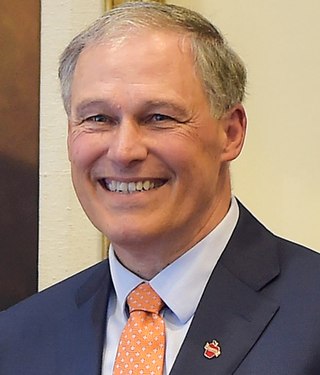
The 2020 Washington gubernatorial election was held on November 3, 2020. It followed a top-two primary held on August 4. Incumbent governor Jay Inslee, the Democratic candidate, defeated Loren Culp, the Republican candidate by a wide margin. Inslee, who was eligible to run for a third term due to the lack of gubernatorial term limits, initially launched a campaign for President of the United States in the 2020 election. When he dropped out of that race in August 2019 due to extremely low polling numbers, he announced he would seek a third term as governor. Several other Democratic political figures considered entering the race if Inslee did not run, including Washington Attorney General Bob Ferguson; no other major Democratic candidates entered the race. Republican Loren Culp, the police chief of Republic, Washington, placed second in the top-two primary and advanced to the general election alongside Inslee.

